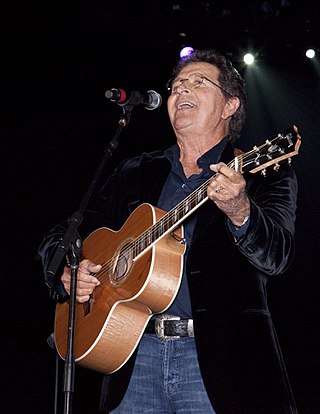
Morris Mac Davis was an American songwriter, singer, performer, and actor. A native of Lubbock, Texas, he enjoyed success as a crossover artist, and during his early career he wrote for Elvis Presley, providing him with the hits "Memories", "In the Ghetto", "Don't Cry Daddy", and "A Little Less Conversation". A subsequent solo career in the 1970s produced hits such as "Baby Don't Get Hooked on Me". Davis also starred in his own variety show, a Broadway musical, and various films and TV shows.
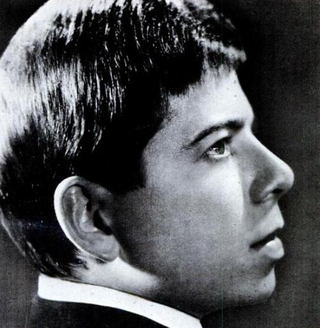
Robert Charles Goldsboro is an American pop and country singer and songwriter. He had a string of pop and country hits in the 1960s and 1970s, including his signature No. 1 hit "Honey", which sold over 1 million copies in the United States, and the UK top-10 single "Summer ".

"You've Lost That Lovin' Feelin'" is a song by Phil Spector, Barry Mann, and Cynthia Weil, first recorded in 1964 by the American vocal duo the Righteous Brothers. This version, produced by Spector, is cited by some music critics as the ultimate expression and illustration of his Wall of Sound recording technique. The record was a critical and commercial success on its release, reaching number one in early February 1965 in both the United States and the United Kingdom. The single ranked No. 5 in Billboard's year-end Top 100 of 1965 Hot 100 hits – based on combined airplay and sales, and not including three charted weeks in December 1964 – and has entered the UK Top Ten on three occasions.
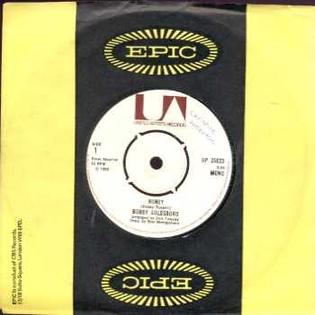
"Honey", also known as "Honey (I Miss You)", is a song written by Bobby Russell. He first produced it with former Kingston Trio member Bob Shane, who was the first to release the song. It was then given to American singer Bobby Goldsboro, who recorded it for his 1968 album of the same name, originally titled Pledge of Love. Goldsboro's version was a hit, reaching No. 1 in several countries.
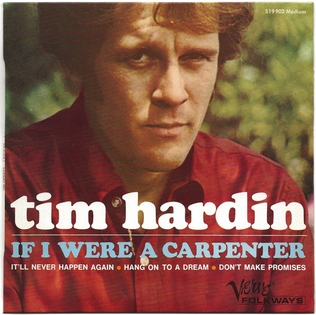
"If I Were a Carpenter" is a folk song written by Tim Hardin in the 1960s, and re-recorded with commercial success by various artists including Bobby Darin, The Four Tops and Johnny Cash. Hardin's own recording of the piece appeared on his 1967 album Tim Hardin 2. It was one of two songs from that release performed by Hardin at Woodstock in 1969. The song, believed by some to be about male romantic insecurity, is rumored to have been inspired by his love for actress Susan Morss, as well as the construction of Hardin's recording studio.

"Lovin' You" is a song recorded by American singer Minnie Riperton from her second studio album, Perfect Angel (1974). It was written by Riperton and her husband, Richard Rudolph, produced by Rudolph and Stevie Wonder, and released as the album's third single on November 29, 1974. The song peaked at number one on the US Billboard Hot 100 on April 5, 1975. Additionally, it reached number two on the UK Singles chart, and number three on the Billboard R&B chart. In the US, it ranked number 13 on the Billboard Year-End Hot 100 singles of 1975.
"And I Love You So" is a popular song written by folk singer and guitarist Don McLean and released on his 1970 debut album, Tapestry. Its chorus features an unusual rhyming scheme for a popular song: ABBA versus the usual AB(C or A)B.
"Little Green Apples" is a song written by Bobby Russell that became a hit for three different artists, with their three separate releases, in 1968. Originally written for and released by American recording artist Roger Miller, "Little Green Apples" was also released as a single by American recording artists Patti Page and O. C. Smith that same year. Smith's version became a #2 hit on both the Billboard Hot 100 and Billboard Hot Rhythm & Blues Singles charts, while Miller's version became a Top 40 hit on the Hot 100 as well as the UK Singles Chart. Page's version became her last Hot 100 entry. The song earned Russell a Grammy Award for Song of the Year and for Best Country Song. In 2013, "Little Green Apples" was covered by English recording artist Robbie Williams featuring American recording artist Kelly Clarkson, which became a top 40 hit in Mexico.
"Lovin' Her Was Easier " is a song written, composed, first recorded, and first released by Kris Kristofferson. It was also recorded and released by Roger Miller, who included it on his album The Best of Roger Miller and released it as a single in July 1971. Ten years later, it was recorded by Tompall & the Glaser Brothers for the album Lovin' Her Was Easier.
"Muddy Mississippi Line" is a single by American country pop artist Bobby Goldsboro. Recorded on June 24, 1969 and released on July 18, 1969, it was the first single from his album Muddy Mississippi Line.

"Darling Be Home Soon" is a song written by John Sebastian of the Lovin' Spoonful for the soundtrack of the 1966 Francis Ford Coppola film You're a Big Boy Now. It appeared on the Lovin' Spoonful's 1967 soundtrack album You're a Big Boy Now. Sebastian performed his composition at Woodstock; it was the fourth song out of the five he performed at the 1969 music festival in White Lake, New York.
"With Pen in Hand" is a song written by Bobby Goldsboro and first released on his March 1968 album, Honey. The song's lyrics address the subjects of divorce and losing custody of one's child, and are sung from the perspective of the parent who expects to be losing custody of their child, as they make a final plea to their spouse to reconcile before the divorce is finalized. "With Pen in Hand" has been a hit for multiple artists in the late 1960s and 1970s.
"See the Funny Little Clown" is a song written and sung by Bobby Goldsboro, which he recorded on October 17, 1963 and released on November 18, 1963. In 1964, the song spent 13 weeks on the Billboard Hot 100 chart, peaking at No. 9, while reaching No. 3 on Billboard's Middle-Road Singles chart, No. 10 on the Cash Box Top 100, and No. 30 on Canada's CHUM Hit Parade.
"Autumn of My Life" is a song written and sung by Bobby Goldsboro, which he released in 1968. The song spent 9 weeks on the Billboard Hot 100 chart, peaking at No. 19, while reaching No. 2 on Billboard's Easy Listening chart, No. 12 on Record World's "100 Top Pops", No. 1 on Record World's "Top Non-Rock" chart, No. 11 on Canada's RPM 100, No. 2 on RPM's Country Chart, and No. 18 on Australia's Go-Set National Top 40.
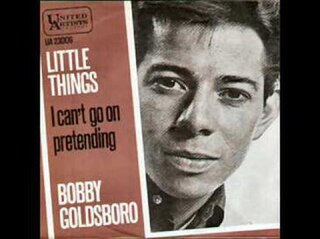
"Little Things" is a song written and sung by Bobby Goldsboro, which he recorded on November 19, 1964, and released in January 1965. The song reached number 13 on the Billboard Hot 100.

"It's Too Late" was a record for Bobby Goldsboro. It was released in 1965 and became a hit the following year in both the United States and Canadian charts.
"I'm a Drifter" is a song written and sung by Bobby Goldsboro, which he released in 1969. The song spent 10 weeks on the Billboard Hot 100 chart, peaking at No. 46, while reaching No. 14 on Billboard's Easy Listening chart, No. 22 of Billboard's Hot Country Singles chart, No. 44 on the Cash Box Top 100, No. 36 on Canada's RPM 100, and No. 9 on RPM's Adult Contemporary chart.
"Molly" is a song released in 1962 by Bobby Goldsboro.

"The Straight Life" is a 1968 song written and originally recorded by Sonny Curtis. It was a top 40 hit for Bobby Goldsboro later that year.

"Summer (The First Time)" is a song by American singer Bobby Goldsboro, recorded for his album of the same name and released as a single in June 1973. It was written by Bobby Goldsboro, Ashley Abram and Timmy Tappan, and produced by Goldsboro and Bob Montgomery.











